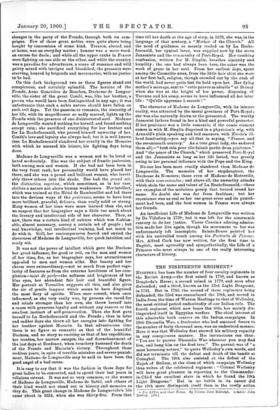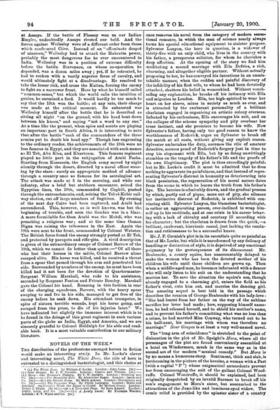THE NINETEENTH REGIMENT.*
NINETEEN has been the number of four cavalry regiments in the British Army,—the first raised in 1759, and known as Drogheda's Horse; a second raised in 1779, and soon after disbanded; and a third, known as the 23rd Light Dragoons, in 1781. But in 1783, the second of these regiments being disbanded, the 23rd was renumbered the 19th, and served in India from the time of Warren Hastings to that of Wellesley, the most critical period undoubtedly of our Indian rule. The fourth regiment, which now bears the title, has mainly dis- tinguished itself in Egyptian warfare. The chief interest of this admirable book centres on the Indian campaigns. In 1800 Dhoondia Wao, a freebooter who had amassed forces to the number of forty thousand men, was an undoubted menace. Here it was that Wellesley first showed his military capacity in any conspicuous manner. His instructions ran thus : "Yon are to pursue Dhoondia Wao wherever you may find him, and hang him on the first tree." The pursuit was of "a most harassing nature," to quote Wellesley's own words, and did not terminate till the defeat and death of the bandit at Conaghul. The 19th also assisted at the defeat of the Rajah of Bullum, at the close of which campaign Wellealey thus writes of the celebrated regiment : "Colonel Wellesley will have great pleasure in reporting to the Commander- in-Chief the excellent state in which he found the 19th Light Dragoons." But in no battle in its career did the 19th more distinguish itself than in the costly action 0 The XIXth and their Tines. By Colonel John Biddulph. Lonlon: John Murray. (169.1 at Assaye. If the battle of Plessey won us our Indian Empire, undoubtedly Assaye riveted our hold. And the forces against Wellesley were of a different order from those which confronted Clive. Instead of an "effeminate despot of nineteen," Wellesley had to attack the Mahratta power, probably the most dangerous foe he ever encountered in India. Wellesley was in a position of extreme difficulty before the battle. Stevenson, on whose co-operation he depended, was a dozen miles away ; yet, if he retreated, he had to reckon with a vastly superior force of cavalry, and would ultimately fight at a disadvantage. He resolved to take the lesser risk, and cross the Kaitna, forcing the enemy to fight on a narrower front. Here by what he himself called "common-sense," but which the world calls the intuition of genius, he surmised a ford. It would hardly be too much to say that the 19th won the battle; at any rate, their charge was made at the critical moment. So exhausted was Wellesley himself after the battle that he is described as sitting all night "on the ground, with his head bent down between his knees," and saying "not a word to any one." At a time like the present, when spies and scouts are playing an important part in South Africa, it is interesting to note that after the battle "each of the commanders of the three armies put to death his head spy." Though less engrossing to the ordinary reader, the achievements of the 19th were no less famous in Egypt, and they are associated with such names as El Teb, Aba Klea, and Khartoum. This famous regiment played no little part in the subjugation of Arabi Pasha. Starting from Kassassin, the English army moved by night silently through the desert, directed by a naval officer steer- ing by the stars : surely an appropriate method of advance through a country once so famous for its astrological art. The attack was made at 5 in the morning, and while our infantry, after a brief but stubborn encounter, seized the Egyptian lines, the 19th, commanded by Coghill, pushed through the entrenchments, and, seizing the Tel-el-Kebir rail- way station, cut off large numbers of fugitives. By evening of the next day Cairo had been captured, and Arabi had surrendered. This, however, as is well known, was but the beginning of trouble, and soon the Soudan was in a blaze. A more formidable foe than Arabi was the Mahdi, who was preaching a religious war ; and at the same time Osman Digna was raising the tribesmen in the East. Again the 19th were sent to the front, commanded by Colonel Webster. The British force found the enemy strongly posted at El Teb, and protected by parapets and rifle-pits. A vivid description is given of the extraordinary escape of Colonel Barrow of the 19th, which we cannot do better than quote :—" Of all those who lost their horses in the mêlée, Colonel Barrow alone escaped alive. His horse was killed, and he received a thrust from a spear that passed through his arm and penetrated his side. Surrounded by numbers of the enemy, he must have been killed had it not been for the devotion of Quartermaster- Sergeant William Marshall, who rode to his assistance, seconded by Sergeant Fenton and Private Boseley. Marshall gave the Colonel his hand. Running in this fashion in rear of the charging squadrons, Barrow, with the heavy spear swaying to and fro in his side, managed to get free of the enemy before he sank down. His attendant trumpeter, in spite of sixteen terrible wounds, kept his horse going, and escaped from the press, to die of his injuries later." We have indicated but slightly the immense interest which is to be found in the doings of this great regiment in such various parts of the globe as India, Egypt, and America, and we are sincerely grateful to Colonel Biddulph for his able and read- able book. It is a most valuable contribution to our military literature.







































 Previous page
Previous page